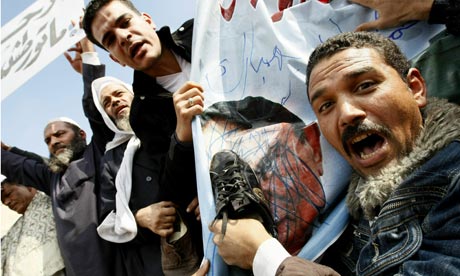
¿Por qué temer el espíritu revolucionario árabe?, por Slavoj Žižek
February 2nd, 2011 → 11:50 am @ elpuercoespín 2
 Cuando se nombró un nuevo gobierno provisional en Túnez, éste excluía a los islamistas y a la izquierda más radical. La reacción de los engreídos liberales fue: bien, son básicamente lo mismo; dos totalitarismos extremos –pero ¿es tan simple como eso? ¿No es precisamente el verdadero antagonismo, a largo plazo, el que hay entre los islamistas y la izquierda? Aún si están momentáneamente unidos contra el régimen, una vez que se acercan a la victoria, su unidad se parte, se traban en combate mortal, a menudo más cruel que contra el enemigo común.
¿No presenciamos precisamente una lucha semejante durante las últimas elecciones en Irán? Aquello que defendían los miles de simpatizantes de Mousave era el sueño popular que había sostenido la revolución de Khomeini: libertad y justicia. Aún si este sueño era utópico, llevó a una impresionante explosión de creatividad política y social, experimentos organizacionales y debates entre estudiantes y gente común. Esta apertura genuina que desató inéditas fuerzas de transformación social, un momento en el cual todo parecía posible, fue gradualmente ahogado mediante la toma del control político por el establishment islamista.
Aun en el caso de movimientos claramente fundamentalistas, uno debería cuidarse de no olvidar el componente social. Los talibanes son presentados regularmente como un gupo islamista fundamentalista que sostiene su dominio mediante el terror. Sin embargo, cuando en la primavera de 2009 tomaron el valle de Swat en Pakistán, The New York Times reportó que habían articulado “una revuelta de clase que explota profundas fisuras entre un pequeño grupo de ricos terratenientes y sus arrendatarios sin tierra”. Si, al“tomar ventaja” del drama de los granjeros, los talibanes están creando, en palabras del New York Times, “alarma acerca de los riesgos para Pakistán, que permanece en gran medida feudal”, ¿qué previene a los demócratas liberales en Pakistán y a los Estados Unidos de “tomar ventaja” del mismo modo de este drama y tratar de ayudar a los granjeros sin tierras? ¿Es que las fuerzas feudales de Pakistán son los aliados naturales de la democracia liberal?
La conclusion inevitable es que el alzamiento del islamismo radical fue siempre el otro lado de la desaparición de una izquierda secular en los países musulmanes. Cuando Afganistán es retratado como el máximo país fundamentalista islámico, ¿quién recuerda aún que, 40 años atrás, era un país con una fuerte tradición secular, que incluía a un poderoso partido comunista que tomó el poder independientemente de la Unión Soviética? ¿Adónde fue esa tradición secular?
Y es crucial leer los hechos que se desarrollan en Túnez y Egipto (y Yemen y… quizás, con suerte, incluso en Arabia Saudita) contra este trasfondo. Si la situación se estabilizada eventualmente de modo tal que el viejo régimen sobreviva pero con alguna cirugía estética liberal, esto generará un irremontable contragolpe fundamentalista. Para que sobreviva el legado liberal clave, los liberales necesitan la ayuda fraternal de la izquierda radical. De nuevo en Egipto, la más vergonzosa y peligrosa reacción oportunista fue la de Tony Blair, según reportó CNN: el cambio es necesario, pero debería ser un cambio estable. Cambio estable en Egipto hoy sólo puede significar un compromiso con las fuerzas de Mubarak mediante un pequeño ensanchamiento del círculo gobernante. Es por esto que hablar de una transición pacífica es hoy una obscenidad: aplastando la oposición, Mubarak mismo hizo esto imposible. Después de que Mubarak envió al ejército contra los manifestantes, la elección se hizo clara: o un cambio cosmético en el que algo cambie para que todo siga igual, o una verdadera ruptura.
Aquí, entonces, llega el momento de la verdad: uno no puede proclamar, como en el caso de Argelia hace una década, que permitir elecciones verdaderamente libres equivale a entregar el poder a los fundamentalistas musulmanes. Otra preocupación liberal es que no hay un poder político organizado de recambio si se va Mubarak. Por supuesto que no hay; Mubarak se ocupó de ello reduciendo a toda la oposición a adornos marginales, así que el resultado es como el título de la famosa novela de Agatha Christie, “Diez Negritos ” (“And Then There Were None”: “Y Entonces No Había Ni Uno”). El argumento a favor de Mubarak –o él o el caos—es un argumento en su contra.
La hipocresía de los liberales occidentales es impresionante: apoyan públicamente la democracia y hoy, cuando la gente se alza contra los tiranos en nombre de justicia y libertad seculares, no en nombre de la religión, están profundamente preocupados. ¿Por qué preocupación, por qué no alegría de que hay una chance para la libertad? Hoy, más que nunca, el viejo lema de Mao Zedong es pertinente: “Hay gran caos bajo el cielo –la situación es excelente”.
¿Adónde, pues, debería ir Mubarak? En esto, la respuesta también es clara: a La Haya. Si hay un líder que merece sentarse allí, es él.
Cuando se nombró un nuevo gobierno provisional en Túnez, éste excluía a los islamistas y a la izquierda más radical. La reacción de los engreídos liberales fue: bien, son básicamente lo mismo; dos totalitarismos extremos –pero ¿es tan simple como eso? ¿No es precisamente el verdadero antagonismo, a largo plazo, el que hay entre los islamistas y la izquierda? Aún si están momentáneamente unidos contra el régimen, una vez que se acercan a la victoria, su unidad se parte, se traban en combate mortal, a menudo más cruel que contra el enemigo común.
¿No presenciamos precisamente una lucha semejante durante las últimas elecciones en Irán? Aquello que defendían los miles de simpatizantes de Mousave era el sueño popular que había sostenido la revolución de Khomeini: libertad y justicia. Aún si este sueño era utópico, llevó a una impresionante explosión de creatividad política y social, experimentos organizacionales y debates entre estudiantes y gente común. Esta apertura genuina que desató inéditas fuerzas de transformación social, un momento en el cual todo parecía posible, fue gradualmente ahogado mediante la toma del control político por el establishment islamista.
Aun en el caso de movimientos claramente fundamentalistas, uno debería cuidarse de no olvidar el componente social. Los talibanes son presentados regularmente como un gupo islamista fundamentalista que sostiene su dominio mediante el terror. Sin embargo, cuando en la primavera de 2009 tomaron el valle de Swat en Pakistán, The New York Times reportó que habían articulado “una revuelta de clase que explota profundas fisuras entre un pequeño grupo de ricos terratenientes y sus arrendatarios sin tierra”. Si, al“tomar ventaja” del drama de los granjeros, los talibanes están creando, en palabras del New York Times, “alarma acerca de los riesgos para Pakistán, que permanece en gran medida feudal”, ¿qué previene a los demócratas liberales en Pakistán y a los Estados Unidos de “tomar ventaja” del mismo modo de este drama y tratar de ayudar a los granjeros sin tierras? ¿Es que las fuerzas feudales de Pakistán son los aliados naturales de la democracia liberal?
La conclusion inevitable es que el alzamiento del islamismo radical fue siempre el otro lado de la desaparición de una izquierda secular en los países musulmanes. Cuando Afganistán es retratado como el máximo país fundamentalista islámico, ¿quién recuerda aún que, 40 años atrás, era un país con una fuerte tradición secular, que incluía a un poderoso partido comunista que tomó el poder independientemente de la Unión Soviética? ¿Adónde fue esa tradición secular?
Y es crucial leer los hechos que se desarrollan en Túnez y Egipto (y Yemen y… quizás, con suerte, incluso en Arabia Saudita) contra este trasfondo. Si la situación se estabilizada eventualmente de modo tal que el viejo régimen sobreviva pero con alguna cirugía estética liberal, esto generará un irremontable contragolpe fundamentalista. Para que sobreviva el legado liberal clave, los liberales necesitan la ayuda fraternal de la izquierda radical. De nuevo en Egipto, la más vergonzosa y peligrosa reacción oportunista fue la de Tony Blair, según reportó CNN: el cambio es necesario, pero debería ser un cambio estable. Cambio estable en Egipto hoy sólo puede significar un compromiso con las fuerzas de Mubarak mediante un pequeño ensanchamiento del círculo gobernante. Es por esto que hablar de una transición pacífica es hoy una obscenidad: aplastando la oposición, Mubarak mismo hizo esto imposible. Después de que Mubarak envió al ejército contra los manifestantes, la elección se hizo clara: o un cambio cosmético en el que algo cambie para que todo siga igual, o una verdadera ruptura.
Aquí, entonces, llega el momento de la verdad: uno no puede proclamar, como en el caso de Argelia hace una década, que permitir elecciones verdaderamente libres equivale a entregar el poder a los fundamentalistas musulmanes. Otra preocupación liberal es que no hay un poder político organizado de recambio si se va Mubarak. Por supuesto que no hay; Mubarak se ocupó de ello reduciendo a toda la oposición a adornos marginales, así que el resultado es como el título de la famosa novela de Agatha Christie, “Diez Negritos ” (“And Then There Were None”: “Y Entonces No Había Ni Uno”). El argumento a favor de Mubarak –o él o el caos—es un argumento en su contra.
La hipocresía de los liberales occidentales es impresionante: apoyan públicamente la democracia y hoy, cuando la gente se alza contra los tiranos en nombre de justicia y libertad seculares, no en nombre de la religión, están profundamente preocupados. ¿Por qué preocupación, por qué no alegría de que hay una chance para la libertad? Hoy, más que nunca, el viejo lema de Mao Zedong es pertinente: “Hay gran caos bajo el cielo –la situación es excelente”.
¿Adónde, pues, debería ir Mubarak? En esto, la respuesta también es clara: a La Haya. Si hay un líder que merece sentarse allí, es él.


Comentarios
Publicar un comentario